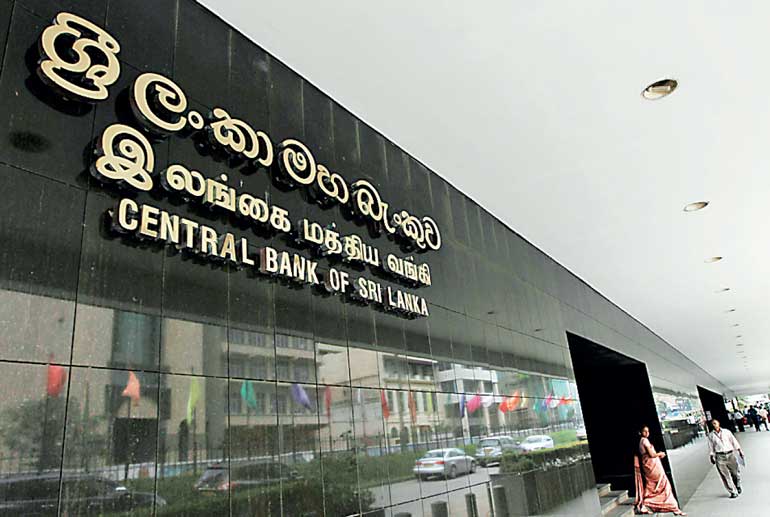Tuesday Feb 24, 2026
Tuesday Feb 24, 2026
Monday, 4 July 2016 00:00 - - {{hitsCtrl.values.hits}}

By Legal Eye
I am surprised at the repetitive observations made by Civil Rights Activists and the leaders of the political parties in the opposition including the former President of Sri Lanka, regarding the urgent need to appoint a new Governor to the Central Bank consequent to the termination of the period of office of Arjuna Mahendran on 30th of June 2016.
Infact, one member of the public announced over the television, that there is a possibility of the economy of the country would be endangered if a Governor is not appointed immediately.
However, any person examining the provisions of the Monetary Law Act (Act) which has established the Central Bank and sets out the provisions relating to the activities of the Central Bank would conclude that it is not the factual position.
Section 8 0f the Act clearly spells out that the Monetary Board of the Central Bank is in addition to determining the policies or measures authorised to be adopted or taken under this Act is vested with the powers, duties and functions of the Central Bank under the Act and is generally responsible for the management, operations and administration of the Central Bank.
The Monetary Board, if it is considered appropriate, s authorised to delegate to the Governor, or to any officer of the Central Bank or to a Committee of such officers, any power, duty or function conferred or imposed on, or assigned to, the Monetary Board. Any power delegated by the Monetary Board has to be performed under the directions of the Monetary Board and the Monetary Board is statutorily responsible for the powers and duties entrusted to it under the Act and/or other applicable statutes.
According to Section 8(2) of the Act the Monetary Board shall consist of:-
(a) the Governor of the Central Bank who shall be the chairman of the Board;
(b) the person holding office for the time being as Secretary to the Ministry of the Minister in charge of the subject of Finance; and
(c)three members appointed by the President on the recommendation of the Minister of Finance, with the concurrence of the Constitutional Council.
In the absence of the Governor from any meeting of the Monetary Board, the Deputy Governor designated as Senior by the Monetary Board acts as his alternate and presides at the meeting and has the right to vote at such meetings.
In the event the Secretary to the Ministry of Finance is unable to attend any meeting
the person holding office for the time being as Deputy Secretary to the Treasury is entitled to attend the meeting and to vote at such meetings
The three appointed members of the Monetary Board as at 1st January 2016 were:-
R.A.Jayatissa, retired Central Bank Officer, Economist
Manohari Ramanathan, Attorney-at-Law, retired officer of the Legal Draftsman Department
Chrishantha Priyanga Richard Perera, Leading Businessman
Despite all the provisions of the Act and as well as those relating to responsibilities of persons holding office as members of Board of statutory bodies, the media and the Civil Society organisations other than W.A.Wijewardena, former Deputy Governor of the Central Bank, have not highlighted to the public the accountability of the Monetary Board in respect of the activities of the Central Bank in relation to the management of the Public Debt and the management and the investment of the funds of the Employees’ Provident Fund.
The members of the Monetary Board appear to take the responsibilities and the repercussions to the country and the economy in the discharge of their duties and functions as Monetary Board members’ casually.
However, on the 24th of May 2016 the term of office of R.A.Jayatissa as a member of the Monetary Board, which was the unexpired period of the term of office of Nimal Welgama, came to an end and consequently, the Monetary Board which is a statutory body is not properly constituted with effect from 24th May 2016 to date.
To my knowledge no items have been published in the media about the President proposing, with the recommendation of the Minister of Finance, name or names of a suitable person to the Constitutional Council, in terms of section 12 (3) of the Act seeking its concurrence, to fill the vacancy in the Monetary Board- the most vital organisation at a time Sri Lanka is faced with several economic issues including important matters relating to Brexit.
In certain statutes, provision is available to ensure that decisions of such a Board would be valid despite a vacancy in the Board or a defect in the appointment of a member to such Board.
Unfortunately, such a provision giving protection and validation to decisions and acts of a not properly constituted Monetary Board is not available in the Act.
Therefore, It is of paramount important for the media and the Civil Society organisations to agitate:-
to ensure the vacancies in the Monetary Board as at 1st of July, i.e the post of Governor and that of one appointed member be filled very early to ensure that a properly constituted Monetary Board that could sue and be sued is in place.
that the same procedure in relation to the appointment of the appointed member of the Monetary Board be introduced in respect of the procedure for the appointment of the Governor of Central Bank with or without an amendment to the Constitution or the Act